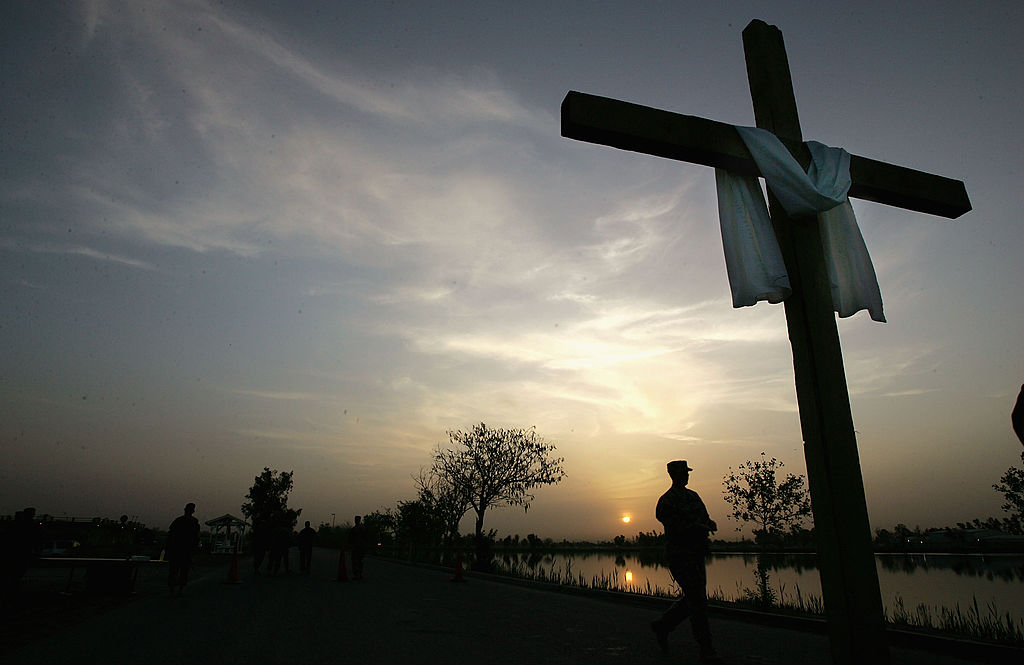The Southern Baptist writer and preacher Michael Spencer coined the phrase “wretched urgency” nearly 20 years ago. He had in mind a disposition common among Christians he had known to rush about in a state of constant discontent and inadequacy, fearful there was some loftier spiritual task they ought to be engaged in but weren’t. Such a fear made impossible ordinary contentment, let alone the settled restfulness that Jesus commends to his listeners in the Sermon on the Mount. To live under wretched urgency and without worry or anxiety, to practice what a friend of mine has called “a Sabbath of the Soul,” is impossible.
Unfortunately, in our cultivation of wretched urgency it seems that American evangelicals have, for once, not followed mainstream American culture, but have led it. Wretched urgency today is less a quirk of scrupulous conservative Baptists and has become a national way of life. Nearly everything about our politics, for example, is an expression of wretched urgency, for both Democrats and Republicans. One side argues that American democracy is going to die if we get the wrong election outcome while the other contends the American nation is going to unravel and collapse. And, of course, the outcome that preserves democracy for the one is the outcome that dooms the nation for the other, and vice versa.
You can also sense the theme of wretched urgency in more day-to-day ways: What is the much discussed social media phenomenon of “FOMO” but a sub-species of wretched urgency: the fear that your choice to do one thing is causing you to miss out on something that might be better? Indeed, there is something about the world of self-creation in which we now live that seems to breed the spirit of wretched urgency: If your very self is a lifelong construction project that you and you alone are responsible to build, how can you not go about in a spirit of low-degree spiritual crisis all the time? There will always be a better place to live, a better job to pursue, a better partner to complement your self-creation quest. It becomes still more devastating when you meet yourself on the way back, holding yourself to the same standard you mete out to others: What if you are the reason someone else might need a better place elsewhere? What if you are the one holding someone back in their professional life, keeping them from becoming, in that obnoxious and increasingly common phrase, “the best version of themselves”? What if you are the partner hanging around someone else’s neck like a stone, hindering their own self invention?
Such habits of thought will breed many things. But a calm restful spirit is not one of them. There is a trick here, however: Some might read me to this point as suggesting that our public and private lives today aren’t ultimately as bad as many of our contemporary worriers suggest. Doesn’t the much-cited advice of Flannery O’Connor spring to mind: “To the hard of hearing you shout, and for the almost-blind you draw large and startling figures.” Aren’t we called to a certain urgency given the degree of the challenges currently facing us?
Certainly, we are called to seriousness—and seriousness must include a sober reckoning with problems and a sober reckoning might sometimes require “drawing large and startling figures.” But the Scriptures speak a better word. Wretched urgency is the posture we take when we are fearful of an outcome, fearful that if we don’t do x the world will end—or a world, at least. Moral seriousness, in contrast, comes from a settled belief that the ends are already known, but we have a part we are privileged to play in the story. The former is wretched because it lacks belief that we live in a just world. The latter is settled because we know that we do, in fact, live in a just world—not one in which justice is fully realized today, to be sure, but one in which final justice is certain. But how can one be confident of final justice? I know of only one way.
And that brings us to Holy Week. On Good Friday, Christians marked the crucifixion of Jesus. We believe that something more happened there than the ordinary political execution of a Jewish religious teacher by the Roman authorities. The crucifixion of Jesus, rather, is the point on which the history of the world pivots. It is the exemplification of wickedness and evil—a cruel and violent execution of an innocent man.
Every act of evil is to be lamented and condemned, of course, but some are so egregious that they haunt those who witness them, rendering them speechless and horrified, mentally begging that the act be stopped, that something would happen to prevent it from happening. C.S. Lewis captures something of the terror in his The Lion, The Witch, and the Wardrobe as the two girls near the heart of his story, Susan and Lucy, witness the death of Aslan, the Christ figure in Lewis’ books. They watch as the book’s great villain, the White Witch, and her servants bind him, shave him, beat him, and mock him, before finally stretching him out on a table, where the witch kills him with a stone knife. Lewis describes the children as tearing their eyes away at the last, because it had become too painful to watch. Or, one might recall the horrified reaction in America to the death of President Abraham Lincoln or, more recently, the appalling shock of 9/11. There are acts of evil so great that they arrest us.
Christianity tells us that the crucifixion is the archetype of human evil, the cosmic calamity that darkens the world entire. But there is something surprising here: As that innocent man dies, he does not die cursing his enemies, threatening vengeance, or calling on his friends to strike back in his name. Even in his dying agonies, that innocent man still did not give in to anger or hatred or bitterness. Instead he prayed for his enemies, even praying that they be forgiven. He could do this not because he was unaffected by their evil, but because he knew of a reality deeper than their evil.
So why would Christians call the day when we remember that event “Good Friday”? It is because we also believe that even the greatest evil imaginable is not so great that it can have final victory. Evil poured itself out so completely that it exhausted itself on the person of Jesus of Nazareth. And then something that, in human terms, seems wholly impossible and unlooked for happened: Jesus rose from the dead, coming back to life after evil had already exhausted itself on him. And that isn’t just good news for Jesus, who conquered death. It means that death and injustice and depravity are not bigger than the creator of the world, that he could subject himself to those very things and still rise over them in triumph. And what he accomplished is given, freely, to those who hope in him. That’s the Christian hope we celebrate on Easter Sunday. When we confess our faith in Christ and are united with him, there is ultimately nothing that can be done to us that is so awful it will overcome what God is doing in us. We are freed from the wretched urgency that pervades our culture not because we are unaffected by the real evils flaying the American body politic, but because we know of a reality deeper than those evils.
What’s more, because evil afflicts the world itself as well, Jesus’ conquest of death means that even the bent and twisted things about the created order will be unmade and restored at the end of all things. The hope Christians have this Easter and, in fact, every day, is the hope that no good thing is ever lost forever, that all things are being made new and restored. Lewis’ friend, the great fantasy author and philologist J.R.R. Tolkien, coined a term for this: eucatastrophe. A eucatastrophe is an event with the same disruptive, world-changing power of a catastrophe, but in which the effect runs in the other direction—a wholly shocking triumph of good over evil, the vindication of hope long nurtured amid darkness.
Tolkien depicts such a thing in his own writings, of course. The destruction of the ring of power in The Lord of the Rings is a eucatastrophe. After the ring is destroyed, one of the heroes of that story, Sam Gamgee, is baffled by this shocking turn toward joy. He had swooned in the darkness and fire of a volcanic mountain, then he awakes. It’s not what he expected: He thought life was at an end and that he and his beloved friend Frodo would die in fire, wretched, worn away, and past all hope. Then he awoke to find himself in a warm bed with friends he thought had died. Then he is told, “you were brought out of the fire to the King. He has tended you, and now he awaits you. You shall eat and drink with him. When you are ready I will lead you to him.”
This is our hope at Easter—that the king is rescuing us and the world from the fire, that he has tended us, and is now waiting to dine with us. All that remains for us is to go to him.







Please note that we at The Dispatch hold ourselves, our work, and our commenters to a higher standard than other places on the internet. We welcome comments that foster genuine debate or discussion—including comments critical of us or our work—but responses that include ad hominem attacks on fellow Dispatch members or are intended to stoke fear and anger may be moderated.
With your membership, you only have the ability to comment on The Morning Dispatch articles. Consider upgrading to join the conversation everywhere.